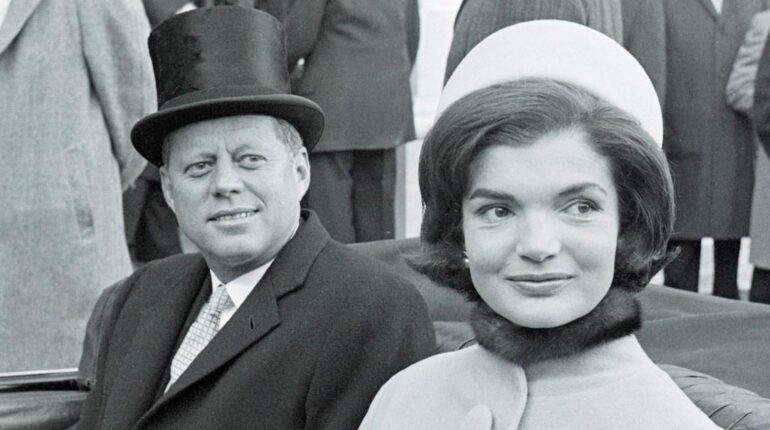📌 JFK’s brutal silence: What he did to Jackie after their first night together

Posted 15 July 2025 by: Admin
The Summer Romance That Almost Never Was: JFK And Jackie’s Rocky Beginning
Behind the glossy veneer of America’s most celebrated political romance lies a far more awkward truth. The legendary love story between John F. Kennedy and Jacqueline Kennedy Onassis began not with sparks flying, but with mutual indifference and a shocking display of emotional detachment that would define their early relationship.
July 4th weekend, 1952. Jackie traveled to the Kennedy family compound in Hyannis Port, stepping into the privileged world that would eventually make her a global icon. The holiday weekend culminated in an intimate encounter that should have marked the beginning of their storied romance. Instead, it revealed JFK’s true character in the most unflattering light possible.
What happened next exposes the harsh reality behind the Kennedy mystique. The moment the weekend ended, Jack vanished. He returned to his political ambitions, leaving Jackie as nothing more than a footnote in his summer plans. The brutal truth, as revealed in J. Randy Taraborrelli’s explosive new biography, cuts through decades of romantic mythology: “it had been the equivalent of a one-night stand for him.”
Both future icons were surprisingly uninspired by each other during those early encounters. For JFK, Jackie’s presence was merely tolerable—convenient when she was there, forgettable when she wasn’t. This wasn’t the passionate beginning of a presidential love story. It was the calculated moves of a man who viewed relationships as casually as political handshakes.
The silence that followed would prove even more devastating.
Five Months Of Silence: When America’s Future First Lady Was Ghosted
The devastating silence stretched far beyond a casual summer fling. What began as JFK’s two-month absence due to his demanding political schedule evolved into something far more cruel—a complete communication blackout that would last five agonizing months.
Jack felt momentarily guilty about his disappearing act, particularly after their intimate encounter at Hyannis Port. But guilt wasn’t enough to make him pick up the phone. His political ambitions consumed every waking moment, leaving no room for the woman he’d left behind. The future senator treated Jackie exactly like what their encounter had been to him: a forgettable one-night stand.
By November 1952, as JFK celebrated his Senate victory, Jackie had reached her breaking point. “By this time, it’d been five months since she’d heard from him, and she’d pretty much given up on him. She was hurt,” Taraborrelli reveals. The pattern was devastatingly clear to everyone except Jack himself.
Jackie’s pain cut deeper than mere romantic disappointment. The future First Lady felt used and discarded, convinced that JFK had orchestrated their entire weekend encounter for his own gratification. “It was as if he’d gotten what he wanted from her, then ditched her.”
The timing wasn’t coincidental. JFK’s Senate campaign had demanded his full attention, and Jackie simply didn’t rank high enough on his priority list to warrant even basic courtesy. America’s future president had effectively ghosted the woman who would become his most valuable political asset.
The silence spoke volumes about the man behind the myth.
The Political Awakening: How Senate Victory Changed Everything
Victory has a way of clarifying priorities, and JFK’s Senate triumph in November 1952 triggered an unexpected shift in his dormant relationship with Jackie. The man who had maintained radio silence for five months suddenly experienced a change of heart—not from guilt, but from political calculation.
Jack reached out, attempting to resurrect what he’d carelessly discarded. A few tentative outings followed, but the damage ran deeper than either anticipated. Their conversations carried the weight of months of silence, each exchange tinged with unspoken resentment and awkward formality.
The inevitable breaking point arrived through an uncomfortable phone call that felt more like a formal breakup than a reconciliation attempt. Neither could bridge the chasm that five months of neglect had created. Jackie’s hurt collided with JFK’s political ambitions, creating an impasse that seemed insurmountable.
Then came the ultimate insult: Jack’s secret European departure in December 1952. He left for his grand tour without informing Jackie, a final act of emotional immaturity that crystallized everything wrong with their connection. The future president treated the woman who would become his greatest political asset as an afterthought, disposable and unworthy of basic courtesy.
Their relationship hung in limbo, seemingly destined for permanent collapse. Jackie had endured months of silence, followed by awkward attempts at reconciliation, only to face abandonment once again. The pattern revealed a man completely disconnected from emotional responsibility, viewing relationships through the lens of personal convenience rather than mutual respect.
JFK’s European escape represented more than geographical distance—it embodied his complete inability to navigate the complexities of genuine human connection.
From Near-Breakup To Presidential Partnership: The Transformation Of 1953
Europe had provided JFK with more than just a scenic escape—it offered crucial perspective on his political trajectory. By January 1953, the newly minted Senator returned with a dramatically altered understanding of what Jackie could offer his ascending career.
The transformation was swift and calculated. Jack now apparently wanted her at his side at major events, and Jackie found herself thrust into the spotlight of high-profile political gatherings. The woman he’d ghosted for five months suddenly became an essential accessory to his senatorial image.
Jackie embraced this unexpected elevation with cautious excitement. The political events of January 1953 showcased her poise and sophistication, qualities that complemented JFK’s raw ambition perfectly. She possessed the refinement his political persona needed—elegant, educated, and effortlessly charming in Washington’s elite circles.
Behind the scenes, Janet Auchincloss watched her daughter’s ascension with undisguised satisfaction. The Kennedy family’s wealth had always fascinated Jackie’s mother, and this political partnership promised access to both fortune and power. Her daughter was finally positioned where she belonged—at the center of American political royalty.
The calculated courtship accelerated with military precision. By September 1953, JFK and Jackie exchanged vows in Newport, cementing what had evolved from a casual summer fling into America’s most strategic political marriage. Their union represented more than romance—it embodied the fusion of personal ambition with political necessity.
The man who’d treated Jackie as disposable now recognized her as indispensable to his presidential dreams.




















